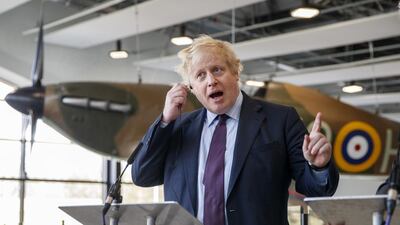Britain won important backing from the European Union in the stand-off with Russia over the poisoning of a Russian spy and his daughter with a suspected nerve agent in southern England.
One explanation for what has been called a "brazen attack" is the Kremlin was keen to test British relations with Europe as the country prepares to depart the Western bloc.
A meeting of foreign ministers in Brussels provided backing for Foreign Secretary Boris Johnson's accusation that Russia targeted former agent Sergei Skripal and his daughter Yulia in the English city of Salisbury with a Soviet-designed military grade nerve agent.
The 28 ministers meeting in Brussels voiced their "unqualified solidarity" with Britain over the attack. "The European Union takes extremely seriously the UK government's assessment that it is highly likely that the Russian Federation is responsible," the ministers said in a joint statement.
"The European Union expresses its unqualified solidarity with the UK and its support, including for the UK's efforts to bring those responsible for this crime to justice."
International chemical weapons experts are due to arrive in Britain on Monday to investigate the incident, which has triggered a fierce diplomatic row between London and Moscow.
Assuming the British finds are endorsed by the UN affiliated OPCW, it remains possible the EU could tighten sanctions on the Kremlin.
Britain, France, Germany and the United States issued a joint statement last week blaming Russia for the attack. Mr Johnson said Russia's denials were designed to stave off tough retaliatory measures from Western states. "What people can see is that this is a classic Russian strategy of trying to conceal the needle of truth in a haystack of lies and obfuscation," he said.
German Foreign Minister Heiko Maas said the EU stood behind British claims.
"We have been informed in great detail in recent days by our colleagues in Britain. All the information we have suggests that there is no alternative plausible explanation to the Russian side bearing a share of the responsibility," Mr Maas said.
French Foreign Minister Jean-Yves Le Drian said Paris also believed Moscow was the source of the attack. "We share the British analysis," he said.
Swedish Foreign Minister Margot Wallstrom rejected Russian suggestions that her country might have stockpiles of Novichok, the nerve agent identified by British scientists.
"This is just ridiculous and totally unfounded. I think that they are trying to make some kind of diversion from the real issues here," she said.
Russian President Vladimir Putin on Sunday dismissed the British accusations as "nonsense," but said that Moscow is ready to cooperate with London in the investigation.
In his first comments on the incident, Putin referred to the poisoning of the ex-Russian spy and his daughter as a "tragedy," but said that if the British claim that they were poisoned by the Soviet-designed nerve agent were true, the victims would have been killed instantly.
A senior Russian foreign policy adviser conceded that the Kremlin was anxious to avoid additional sanctions and predicted it would strike a more conciliatory tone now that the elections were out of the way.
"The most dangerous development for Russia would be a new cycle of EU sanctions," he said. "Now with elections behind him Mr Putin might be more willing to engage in some kind of dialogue with the United Kingdom."


